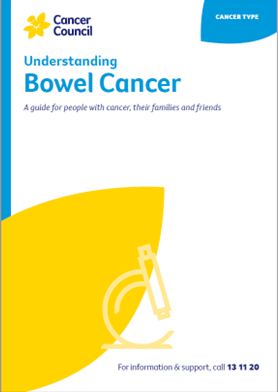- Home
- Bowel cancer
- Managing side effects
- Managing bowel and dietary changes
- Eating after treatment
Eating after treatment
Immediately after treatment – particularly surgery – you may be on a modified diet. What you are able to eat might depend on the type of surgery you’ve had, how much of your bowel was removed and whether you have a stoma.
Learn more about:
Overview
During and after recovery from treatment, you may find that certain foods upset your bowel, and cause diarrhoea or wind.
Your health care team may suggest foods to avoid, but as foods can affect people differently, you will need to experiment to work out which foods cause problems for you. It is better to limit – not exclude – these foods in your diet, as you may find that what you can handle improves over time.
Keeping a diary of what you eat can help. Make a note of the foods that cause constipation, diarrhoea or wind. Your ability to handle different foods usually gets better with time but can take many months. When returning to your usual diet, introduce one food at a time. If something causes a problem, try it again in a few weeks to see if your response has improved. Share this information with the health care team as it can help them figure out how to manage any issues.
For more information on eating well during and after cancer treatment, see Nutrition and cancer.
Eating with a stoma
If you have a stoma, you may need to change what you eat in the first few weeks to help the stoma settle. The amount of stoma output will vary depending on how much you eat and when you eat.
Nuts, seeds and very fibrous foods can block the stoma. By trial and error, you might work out which particular foods irritate the stoma, but these vary considerably between people.
Most people with a stoma return to their usual diet. If you have concerns,
ask your doctor or stomal therapy nurse to refer you to a dietitian.
Ways to manage stoma blockages
- Eat regular meals.
- Avoid eating a large amount of food at one time.
- Try to maintain a balanced diet so your body gets the nutrients it needs.
- Aim to drink 8–10 glasses of fluid a day so you stay well hydrated.
- Cut food into small, bite-sized pieces, and chew slowly and thoroughly.
- If you have trouble eating certain foods, talk to a dietitian about alternatives.
- You may find cooked foods easier to digest.
- Limit foods that are more likely to cause blockages. These include high-fibre foods, raw vegetables, fruit and vegetable skins, nuts, seeds, kernels (e.g. corn, popcorn) and sausage skins.
- Have small amounts of a new food. If it doesn’t irritate the stoma, try more next time.
- Massage your belly and the area around the stoma. Lie on your back and pull your knees up to your chest and roll from side to side. This may help move the blockage through the stoma.
When I first got put back together after the ileostomy, processed food really messed with me. The more processed it is, the slower my body deals with it. Some of the things I loved – pizza, processed meat, bread, red meat and potato – play with me. The greener the better – salads fruit, fish, chicken really make me feel sensational.
Richard
→ READ MORE: Life after treatment for bowel cancer
Podcast: Appetite Loss and Nausea
Listen to more episodes from our podcast for people affected by cancer
More resources
A/Prof David A Clark, Senior Colorectal Surgeon, Royal Brisbane and Women’s Hospital, QLD, The University of Queensland and The University of Sydney; Yvette Adams, Consumer; Dr Cameron Bell, Gastroenterologist, Royal North Shore Hospital, NSW; Katie Benton, Advanced Dietitian Cancer Care, Sunshine Coast University Hospital and Queensland Health, QLD; John Clements, Consumer; Dr Fiona Day, Medical Oncologist, Calvary Mater Newcastle, NSW; Alana Fitzgibbon, Clinical Nurse Consultant, GastroIntestinal Cancers, Cancer Services, Royal Hobart Hospital, TAS; Prof Alexander Heriot, Consultant Colorectal Surgeon, Director Cancer Surgery, Peter MacCallum Cancer Centre, and Director, Lower GI Tumour Stream, Victorian Comprehensive Cancer Centre, VIC; Caitriona Nienaber, 13 11 20 Consultant, Cancer Council WA; Dr Kirsten van Gysen, Radiation Oncologist, Nepean Cancer Care Centre, NSW.
View the Cancer Council NSW editorial policy.
View all publications or call 13 11 20 for free printed copies.

